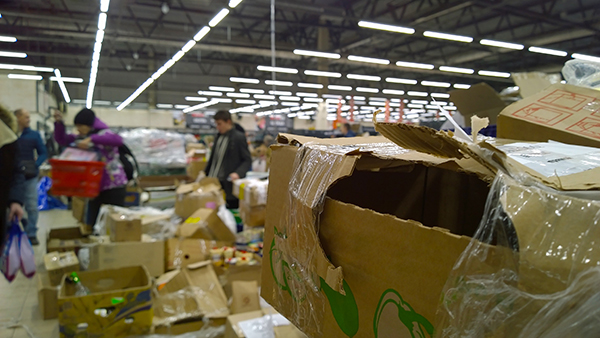Crime is killing brick & mortar stores
11/16/2023 / By News Editors

Crime in America is completely out of control. Since looting is legal in Soros-backed blue cities, countless stores and businesses are fleeing. This is also occurring with the most basic stores, such as pharmacies and grocers. Countless stores have begun locking up their inventory, and shoppers must flag down an associate to purchase low-cost items. They do not even do this in third-world countries as the issue here is psychological. Crime and not creative destruction will be the end of brick & mortar stores.
(Article republished from ArmstrongEconomics.com)
One pharmacy in Washington, DC, has resorted to arranging pictures of products on their shelves. One social media user showed that even the toilet paper is missing from the shelves, replaced with a framed picture of the product. The workers at these locations cannot personally shop for each customer, and people are refraining from in-person shopping in general.
Around 70% of the US population shops online, spending an average of $3,428 per year. This figure will likely rise as it is simply not possible to shop in physical stores amid this intense crime wave. Online shopping in the US has increased by 16.2% since 2020, and global online sales are expected to reach $7 trillion in 2024. This is an international trend as countries like the Philippines (+26%), India (+26%), Indonesia (+23%), Brazil (+22), and Vietnam (+19%) among countless others have seen a spike in e-commerce in the past year alone.
In Asia, the shift toward online shopping is due to convenience. This is the creative destruction Schumpeter promoted, as it is simply faster and more time-efficient for many to shop online. In the US, however, the trend toward online shopping is being fueled by CRIME.
But brick & mortar stores have served a purpose in our society. If I buy a new suit, I want to feel the material and try the clothing on. I do not want to return and reorder items as that eliminates the convenience factor. The troubling thing here is that Americans living in high-crime cities no longer have access to the basic necessities. No one wants to wait 15 minutes for an associate to grab toilet paper from the back of the store. How low have we fell as a society when we cannot trust our fellow man to act humanely? There are countless societies that have say markets with no cashier as each person is trusted to leave behind the proper payment.
We will see a surge of government-run stores that are guarded and managed by the public sector. The globalists will have an easier time turning American cities into 15-minute cities since the city government will already have control over the food supply, and those receiving government aid will be required to shop there.
So while brick & mortar stores are dying, there is a cancerous wave of degeneracy infecting American cities. In recent years, the government led masses to feel entitled and underprivileged. They are the victims despite committing crimes. This view is promoted in universities as well. That us vs them mentality has led to a divide where Americans do not view their fellow Americans as neighbors and it is destroying the most basic aspects of society.
Read more at: ArmstrongEconomics.com
Submit a correction >>
Tagged Under:
anarchy, big government, blue cities, Bubble, chaos, Collapse, conspiracy, crime, current events, dangerous, debt bomb, debt collapse, economic riot, finance riot, globalists, grocery, insanity, left cult, market crash, money supply, online shopping, risk
This article may contain statements that reflect the opinion of the author
RECENT NEWS & ARTICLES
COPYRIGHT © 2018 MONEYSUPPLY.NEWS
All content posted on this site is protected under Free Speech. MoneySupply.news is not responsible for content written by contributing authors. The information on this site is provided for educational and entertainment purposes only. It is not intended as a substitute for professional advice of any kind. MoneySupply.news assumes no responsibility for the use or misuse of this material. All trademarks, registered trademarks and service marks mentioned on this site are the property of their respective owners.





















